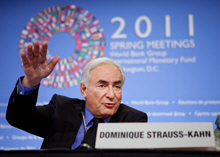
Typical street scene in Santa Ana, El Salvador. (Photo: iStock)
IMF Survey: ‘Beware Complacency,’ World Not Yet In Post-Crisis Era—IMF Chief
April 14, 2011
- World economy recovering from global crisis, but in unbalanced way
- Recovery means little if growth does not translate into jobs
- Interconnected world needs more cooperation on policies
IMF Chief Dominique Strauss-Kahn, arguing that the global economy was recovering but in an unbalanced way, said ahead of the IMF–World Bank Spring Meetings that the world should “beware of complacency.”

Strauss-Kahn: “… it would be part of the complacency I am trying to avoid to believe that we are in the post-crisis era” (photo: Stephen Jaffe/IMF)
IMF-WORLD BANK SPRING MEETINGS
“We must beware of complacency. Certainly the recovery is getting stronger, but everybody can understand that it’s not the recovery we want because it’s unbalanced between countries and it’s also unbalanced within countries. That’s the reason why uncertainty is still very high,” Strauss-Kahn told a news conference.
He said the consequences of the global economic and financial crisis are still very apparent. “The apex of the crisis is behind us, but it would be part of the complacency I am trying to avoid to believe that we are in the post-crisis era.”
‘Jobs, jobs, jobs’
Recovery would mean little to people around the world if it showed up in macroeconomic data that did not translate into jobs, Strauss-Kahn said. He recalled that, a year ago he was concerned about the possibility of a recovery without jobs. “It’s probably too much to say that we have a jobless recovery. It’s certainly a recovery, but without enough jobs. So the question now is jobs, jobs, jobs.”
Strauss-Kahn noted that the key IMF publications World Economic Outlook, Global Financial Stability Report, and Fiscal Monitor had this week outlined the challenges facing the world economy.
In advanced economies unemployment is still high, and there remain fiscal and financial vulnerabilities. Some emerging market economies face the risk of overheating, and many low-income countries confront the threat of food and fuel prices rising to high levels last seen in 2008.
For advanced economies, urgent action was needed on
• Financial sector repair and reform: bank stress tests need to be linked to some form of recapitalization, on extending supervision to the shadow banking sector, dealing with systemically important financial institutions, implementing the macroprudential framework, cross-border banking resolution, and completing work on possible taxation of the financial sector.
• Sovereign debt: putting fiscal policy on a sustainable path over the medium term is a real concern, and has to be accomplished without hindering the fragile recovery.
Emerging market economies face the question of overheating. Depending on the country, there may be a need to tighten monetary policy and withdraw fiscal stimulus, while at the same time rebalancing growth.
Where capital inflows are substantial and traditional responses such as a higher exchange rate and reserve accumulation are already at work, macroprudential measures and sometimes capital controls could be useful on a temporary and country-specific basis.
Beside the risks posed by higher food and fuel prices, low-income countries were also threatened by jobless growth, and programs could be drawn up with development partners to channel the benefits of higher growth into job creation. Strauss-Kahn noted that growth in Africa is picking up more rapidly after the latest global crisis than after previous crises, when there had been a long delay before Africa recovered. But rapid recovery in growth alone is not enough, he stressed.
Global cooperation critical
Strauss Kahn said the Spring Meetings are an opportunity to take stock of what has been done on reforming the international monetary system to try to prevent instability and crisis. He noted that the IMF is moving this agenda forward in key areas, including on capital inflows, spillovers between countries, and establishing a global financial safety net.
“To do all this … we need more cooperation,” Strauss-Kahn said. “We are now in an interconnected world which does not leave any room for local solutions to global challenges that are decided by countries without taking into account the consequences on others.” During the recent global crisis, such cooperation had saved the world from a depression that could have been as deep as the Great Depression of the 1930s, he added.


